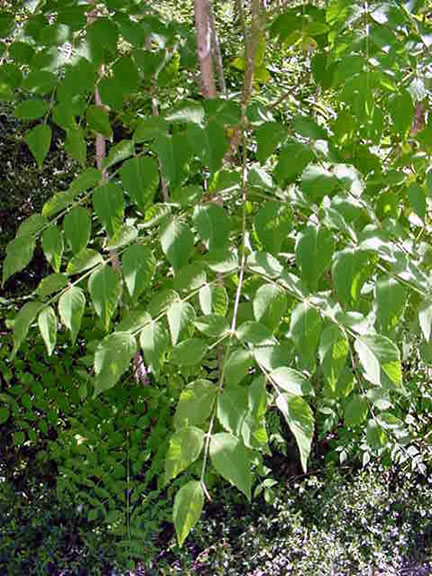
Woody > Aralia > Aralia spinosa > Aralia spinosa
Aralia spinosa
Devil's Walking Stick
Origin: Eastern United States.
| Family |
| Araliaceae |
| Genus |
| Aralia |
| Species |
| spinosa |
| Category |
| Woody |
| Type |
| Tree (deciduous) |
| Pronunciation |
| USDA Hardiness Zone |
| 5 |
| Canadian Hardiness Zone |
| 4 - 6a |
| RHS Hardiness Zone |
| H7 |
| Temperature (°C) |
| -29 - (-23) |
| Temperature (°F) |
| -20 - (-10) |
| Height |
| 12 m |
Photographs
Description and Growing Information
Flowering Period
| Shape |
| A clump-forming shrub or small tree. |
| Growth |
| Fast |
| ID Characteristic |
| A southern United States native plant, A. spinosa is commonly seen in most landscapes as a grouping of plants. This is due to its nature of producing runners from which emerge a profusion of new shoots. It has a soft delicate texture because of its pinnately compound leaves; however, after the leaves have dropped in the winter the plant has a club like appearance. This strange appearance (hense the common name) is enhanced by the sharp spikes running up and down the trunks. It can reach a height of about 5-6 m and is extremely attractive in bloom in mid-summer, when the flower inflorescence transcend from green to cream over a period of several weeks. It then produces airy clusters of small purple fruit, which seems to have an intoxicating effect on birds. I remember as a student often finding dead birds who had flown into the lecture hall windows after feasting on the nearby Aralia. A. spinosa is tolerant of a wide variety of soil conditions and tends to thrive on neglect, because of it habit to run however; siting should be given careful consideration. |
| Leaf Description |
| Leaves are large, to 70 cm, with 7-13 leaflets per pinna growing to 18 x 12 cm (although usually smaller). |
| Flower Description |
| Flowers are small. |
| Fruit Description |
| Fruit is play, 5-6 mm in diameter. |
| Propagation |
| Root cuttings collected in the autumn and cut into 50 mm lengths and insert vertically into pots or flats barley covering the top. Water and place in a cold frame until growth appears and then pot individually. |
